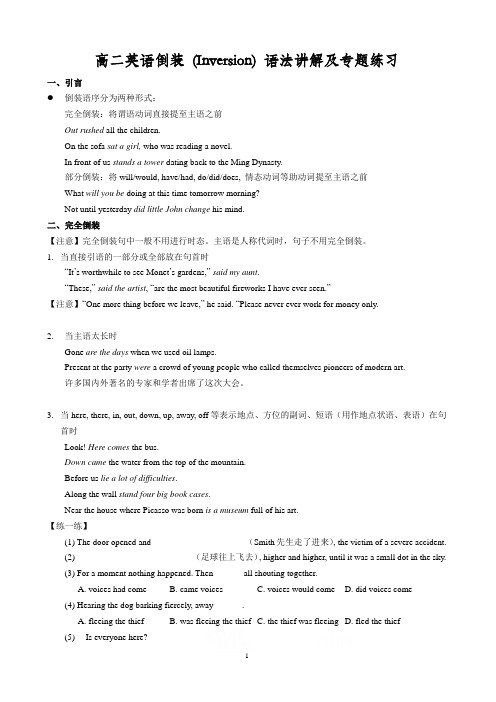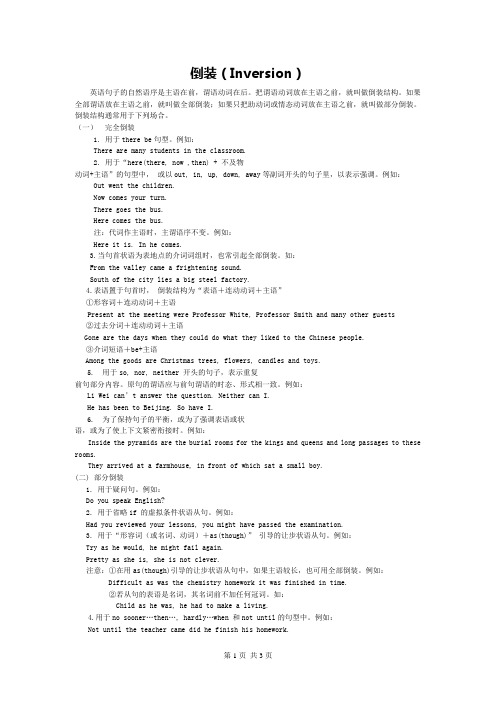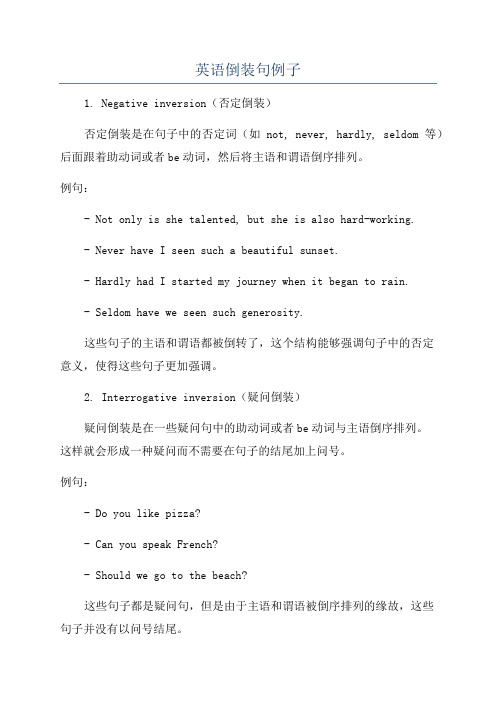高三英语:倒装句-Inversion倒装句型规则讲解练习
高二英语倒装 (Inversion) 语法讲解及专题练习

高二英语倒装(Inversion) 语法讲解及专题练习一、引言倒装语序分为两种形式:完全倒装:将谓语动词直接提至主语之前Out rushed all the children.On the sofa sat a girl, who was reading a novel.In front of us stands a tower dating back to the Ming Dynasty.部分倒装:将will/would, have/had, do/did/does, 情态动词等助动词提至主语之前What will you be doing at this time tomorrow morning?Not until yesterday did little John change his mind.二、完全倒装【注意】完全倒装句中一般不用进行时态。
主语是人称代词时,句子不用完全倒装。
1. 当直接引语的一部分或全部放在句首时“It’s worthwhile to see Monet’s gardens,”said my aunt.“These,”said the artist, “are the most beautiful fireworks I have ever seen.”【注意】“One more thing before we leave,” he said. “Please never ever work for money only.2. 当主语太长时Gone are the days when we used oil lamps.Present at the party were a crowd of young people who called themselves pioneers of modern art.许多国内外著名的专家和学者出席了这次大会。
____________________________________________3. 当here, there, in, out, down, up, away, off等表示地点、方位的副词、短语(用作地点状语、表语)在句首时Look! Here comes the bus.Down came the water from the top of the mountain.Before us lie a lot of difficulties.Along the wall stand four big book cases.Near the house where Picasso was born is a museum full of his art.【练一练】(1) The door opened and ______________________(Smith先生走了进来), the victim of a severe accident.(2) __________________________ (足球往上飞去), higher and higher, until it was a small dot in the sky.(3) For a moment nothing happened. Then ______ all shouting together.A. voices had comeB. came voicesC. voices would comeD. did voices come(4) Hearing the dog barking fiercely, away ______.A. fleeing the thiefB. was fleeing the thiefC. the thief was fleeingD. fled the thief(5) ---Is everyone here?---Not yet. Look, there ______ the rest of our guests!A. comeB. comesC. is comingD. are coming(6) From the window ______--- there must be a concert in the hall.A. sound of music cameB. came sound of musicC. did sound of music comeD. did come sound of music(7) There on the ground ______ a poor girl of sixteen years old.A. did layB. did lieC. laidD. lay(8) In the middle of the square ______ with a statue of a hero on top of it.A. stands a stoneB. does a stone standC. a stone standsD. a stone does stand(9) Between the two rows of trees ______ the teaching building, which ______ built in the 1990s.A. stands; wasB. stand; wasC. stands; wereD. stand; were(10) At the meeting place of the Yangtze River and the Jialing River ______, one of the ten largest cities inChina.A. lies ChongqingB. Chongqing liesC. does lie ChongqingD. does Chongqing lie(11)______ and the mouse was caught.A. Up the cat jumpedB. The cat up jumpedC. Up jumped the catD. Jumped up the cat4、such pron.“这样的人(或事物);上述的人(或事物)”Accountants were boring. Such was her opinion before meeting Ian.做会计的个个乏味。
高三英语语法复习系列一Inversion(倒装)答案

高三英语语法复习系列一Inversion(倒装)答案Inversion(倒装)答案(一)完全倒装(不借助助动词)here/there/now/then/up/down/in/out/away/off+不及物动词eg:come,go,lie,exist+主语(必须是名词)Here comes the bus.Here it comes.表地点的介词短语位于句首,谓语为不及物动词,主语为名词。
Under the big tree sat some farmers.表语位于句首Such are the facts, no one can deny them.直接引语+谓语(say, tell, ask…+主语倒装不倒装均可“This is an important language point,” said the English teacher.副词/形容词/名词/ed分词/动词+as/though/thatAngry as he was,/ Much as I admire her(二)部分倒装(需借助助动词、系动词、情态词、有动词)Only+副词/介词短语/状语从句+助动词+主Only by reading as much as possible can we learn English well.否定词语by no means/ in no way/ in no case/ on no account/ under no circumstances/no longer/no more/ no sooner/not/never/seldom/hardly/barely/ scarcely/few/little等位于句首Hardly/ scarcely/ barely had we finished our work when the bell rang.细分:not a word/ not a moment/ not only/ not until位于句首Not until I went to school did I learn English.Neither+倒装句nor+倒装句Neither is he wrong nor are you.Neither…nor..连接并列宾语或并列状语+助动词+主谓结构Neither French nor German does he know.Neither on Saturday nor on Sunday do we have a rest.So+助动词+主语so will I.neither/nor+助动词+主语Tom hasn’t gone abroad, and neither/nor have I.So+adj/adv 或Such+(a/an)+adj+n位于句首So fast did he speak that I could not follow him.非真实条件句中如果有were/ had/ should, 则省掉if,再把were/ had/ should提到句首。
倒装(Inversion)

倒装(Inversion)一概述在英语中,主语和谓语的语序通常是主语在前,谓语在后,但有时谓语的全部或一部分却提到主语的前面,这种语序叫做“倒装”。
倒装分为“全部倒装”和“部分倒装”。
在全部倒装的句子中,整个谓语都放在主语的前面;在部分倒装的句子中,只是谓语中的一部分(如助动词、情态动词或系动词be等)放在主语前面,其余部分仍放在主语后面。
一)完全倒装完全倒装即把整个谓语放到主语之前(是整个谓语动词,而非助动词)。
例如:In came the teacher and the class began . (老师走了进来,然后开始上课。
)1.在there be 结构中There is a rumour that a large company wants to build a factory in your town.There will be a basketball match this afternoon.2、在以there或here开头的句子中,谓语动词为be, come, go, run, walk, rush, fall以示强调。
例如:Here is China’s largest tropical forest.Here are some picture-books.There comes the bus!There goes the bell!Here comes Mary!注:如果主语为人称代词,仍用自然语序,例如:Here you are. / Here we are. / Here it isThere he comes! Here she comes!3、在以out, in ,up, down, away等副词开头的句子中,谓语动词为be, come, go, run, walk, rush, fall等,以示强调。
例如Up flew the red balloon.Out rushed a policeman from among the crowd.注:如果主语为人称代词,仍用自然语序,例如Away they went./ Down it flew. / Up it went.4、由then 或now引起,谓语动词为come, follow, begin, end, be等的句子,Then came a new difficulty.Then followed eight years of the Anti-Japanese War.Now comes your turn.5、直接引语的一部分或全部放在句首时,有时也用倒装。
Inversion倒装

Inversion倒装按“主语+谓语”这种顺序排列的句子是陈述语序,如果将某个句子成分移至句首而引起主语和谓语顺序的颠倒,使句子的排列顺序变为“谓语(或谓语的一部分)+主语”就是倒装句。
倒装有两种情况:完全倒装和部分倒装。
一、完全倒装Full Inversion (主语和谓语完全倒置)1.在there, here引导的表示存在的句型中,谓语是be,exist,stand,lie ,live等表示状态的不及物动词。
eg. There was a mountain long long ago. (从前有座山)There stood a temple at the top of the mountain. (山上有座庙。
)There loved three monks in the temple. (庙里有三个和尚。
)2.句子谓语是go,come,run等表示位置移动的动词和be动词,句中又有表示方位的副词(here,there,off,up,down,out,in,away等),当其主语为名词时,为了强调该副词,可将其放于句首,后面用陈述句语序,即主谓不倒装。
eg. There goes the bell ! 铃响了!Here comes your husband ! 你丈夫来了!Down come the rain ! 下雨了。
Here comes the train to Beijing. 去北京的火车来了。
Off goes the woman ! 那个女人走了。
Away went the boy to the school. 那男孩子到学校里去了!Here she comes. 她来了。
Here you are . 给你。
3.副词now,then,thus引导的句子里,谓语是come,follow,begin,and,be等。
eg. Now comes your turn !Then followed a shot of gun !Thus ended the meeting !4.为了强调句中的状语或表语,为了保持句子平衡或上下文衔接紧密,在叙述性和描绘性的书面语中,句中主语和谓语完全倒装,可将状语或表语置于句首。
倒装(INVERSION)

倒装(Inversion)英语句子的自然语序是主语在前,谓语动词在后。
把谓语动词放在主语之前,就叫做倒装结构。
如果全部谓语放在主语之前,就叫做全部倒装;如果只把助动词或情态动词放在主语之前,就叫做部分倒装。
倒装结构通常用于下列场合。
(一)完全倒装1. 用于there be句型。
例如:There are many students in the classroom.2. 用于“here(there, now ,then) + 不及物动词+主语”的句型中,或以out, in, up, down, away等副词开头的句子里,以表示强调。
例如:Out went the children.Now comes your turn.There goes the bus.Here comes the bus.注:代词作主语时,主谓语序不变。
例如:Here it is. In he comes.3.当句首状语为表地点的介词词组时,也常引起全部倒装。
如:From the valley came a frightening sound.South of the city lies a big steel factory.4.表语置于句首时,倒装结构为“表语+连动动词+主语”①形容词+连动动词+主语Present at the meeting were Professor White, Professor Smith and many other guests②过去分词+连动动词+主语Gone are the days when they could do what they liked to the Chinese people.③介词短语+be+主语Among the goods are Christmas trees, flowers, candles and toys.5.用于so, nor, neither 开头的句子,表示重复前句部分内容。
英语倒装句例子

英语倒装句例子1. Negative inversion(否定倒装)否定倒装是在句子中的否定词(如not, never, hardly, seldom等)后面跟着助动词或者be动词,然后将主语和谓语倒序排列。
例句:- Not only is she talented, but she is also hard-working.- Never have I seen such a beautiful sunset.- Hardly had I started my journey when it began to rain.- Seldom have we seen such generosity.这些句子的主语和谓语都被倒转了,这个结构能够强调句子中的否定意义,使得这些句子更加强调。
2. Interrogative inversion(疑问倒装)疑问倒装是在一些疑问句中的助动词或者be动词与主语倒序排列。
这样就会形成一种疑问而不需要在句子的结尾加上问号。
例句:- Do you like pizza?- Can you speak French?- Should we go to the beach?这些句子都是疑问句,但是由于主语和谓语被倒序排列的缘故,这些句子并没有以问号结尾。
3. Adverbial inversion(副词倒装)副词倒装常常出现在一些表达地点或时间的副词(如here, there, now, then, on the front)在句首的情况下。
例句:- There went my chance.- Then came the storm.- On the front are the main headlines.这些句子中的副词被放在句子的最前面,并且主语和谓语被倒序排列了。
4. Emphatic inversion(强调倒装)强调倒装通常强调句子中的某个部分,被强调的部分通常在句首。
倒装句Inversion
倒装句Inversion: 全部倒装和部分倒装1. 全部倒装是只将句子中的谓语动词全部置于主语之前。
此结构通常只用于一般现在时和一般过去时。
常见的结构有:1)here, there, now, then, thus等副词置于句首, 谓语动词常用be, come, go, lie, run等表示来去或状态的动词。
例如:Then came the chairman. 那时总裁来了。
Here is your letter. 你的信。
2)表示运动方向的副词或地点状语置于句首,谓语表示运动的动词。
例如:Out rushed a missile from under the bomber. 轰炸机肚底下窜出一枚导弹。
Ahead sat an old woman. 前面坐着一个老妇。
注意:上述全部倒装的句型结构的主语必须是名词,如果主语是人称代词则不能完全倒装。
例如:Here you are.Here he comes. 他来了。
Away they went. 他们走开了。
2. 部分倒装是指将谓语的一部分如助动词或情态倒装至主语之前。
如果句子的谓语没有助动词或情态动词,则需添加助动词do, does或did,并将其置于主语之前。
1) 句首为否定或半否定的词语,如no, not, never, seldom, little, hardly, scarcely, at no time决不, by no means, on no account, in no case, under no circumstances, in no way 等。
如否定词不在句首不倒装。
例如:Never have I seen such a performance. 从未见过如此糟糕的表演。
Nowhere will you find the answer to this question. 无论如何你不会找到这个问题的答案的。
2)以否定连词开头作部分倒装,如Not only…but also, Hardly/Scarcely…when, No sooner…than, Not until…等引出主从复合句,主句倒装,从句不倒装,即前倒后不倒。
英语语法-Sentence Inversion倒装句解题思路及真题演练共44页文档
▪
29、勇猛、大胆和坚定的决心能够抵得上武器的精良。——达·芬奇
▪
30、意志是一个强壮的盲人,倚靠在明眼的跛子肩上。——叔本华
谢谢!
44
英语语法-Sentence Inversion倒装句 解题思路及真题演练
16、自己选择的路、跪着也要把它走 完。 17、一般情况下)不想三年以后的事, 只想现 在的事 。现在 有成就 ,以后 才能更 辉煌。
18、敢于向黑暗宣战的人,心里必须 充满光 明。 19、学习的关键复。
20、懦弱的人只会裹足不前,莽撞的 人只能 引为烧 身,只 有真正 勇敢的 人才能 所向披 靡。
▪
26、要使整个人生都过得舒适、愉快,这是不可能的,因为人类必须具备一种能应付逆境的态度。——卢梭
▪
27、只有把抱怨环境的心情,化为上进的力量,才是成功的保证。——罗曼·罗兰
▪
28、知之者不如好之者,好之者不如乐之者。——孔子
高考英语语法一轮复习——倒装句(inversion)
rewrite the sentences
Exercise
I didn't know the news until yesterday.
Not until yesterday did I know the news.
动词 Be
5
五全八部话倒装
6
有 时表 地 方
不 只 让步 也 常 需 如此 祝福
7
五全
有 时表 地 方
8
有
there be 句型
在这个房间里有很多可爱的学生。 There are many lovely students in the room.
9
Exercise
Translate these sentences
20
4.Out _____________.
A. rushed the children B. did the children rush C. the children rushed D. rushed the children did
21
不 只 让步 也 常 需 如此 祝福
22
not, no, never, nowhere
Inversion倒装句
倒装语序 inverted order
predicate 谓 + subject 主
4
inversion
↙
↘
完全倒装
部分倒装
full inversion
partial inversion
↓
↓
predict(谓语)+subject(主) 助动词auxiliary
情态动词Modal auxiliary
15
方
高考英语二轮复习特殊句式考点讲解含解析
特殊句式知识点一、倒装句(一)完全倒装(Full Inversion)谓语动词完全放在主语之前的句子便是完全倒装句。
这类句型主要有:1.表示方式、方位的副词或介词短语,如here, there, up, down, in, away, off, out, in the room, on the wall等,置于句首,且主语是名词时。
如:In a lecture hall of a university in England sits a professor.在英格兰一所大学的讲堂里坐着一位教授。
South of the river lies a small factory.一个小型工厂坐落在河的南岸。
Out rushed the children.孩子们冲了出去。
2.such置于句首时。
如:Such was Albert Einstein, a simple man and the 20th century's greatest scientist.这就是艾伯特·爱因斯坦,一个朴实的人,也是20世纪最伟大的科学家。
(二)部分倒装(Partial Inversion)只把谓语的一部分(多为助动词或情态动词)置于主语之前的句子叫部分倒装句。
这类句型主要有三种:1.only修饰副词、介词短语或状语从句,且放在句首时。
如:Only in this way can we learn English well.只有以这种方法,我们才能学好英语。
Only when he returned did we find out the truth.只有当他回来时,我们才查明了真相。
使用特点:(1)在部分倒装句中,如果谓语部分无助动词,则须找助动词来“帮助”它构成倒装句。
如:(×)Only after the war learned he the sad news.(√)Only after the war did he learn the sad news.只是在战后他才知道那个悲惨的消息。
- 1、下载文档前请自行甄别文档内容的完整性,平台不提供额外的编辑、内容补充、找答案等附加服务。
- 2、"仅部分预览"的文档,不可在线预览部分如存在完整性等问题,可反馈申请退款(可完整预览的文档不适用该条件!)。
- 3、如文档侵犯您的权益,请联系客服反馈,我们会尽快为您处理(人工客服工作时间:9:00-18:30)。
Inversion 倒装句型Step 1: A quiz of the previewYou were asked to preview 预习 “Inversion” on Page 89 . Now see how much you know about it.1. How many kinds of inversions are there in English? What are they?2. Read the inversion sentences in Reading I on Page 26.Summary:a. 句子的基本语序:_________________ eg: I love English.b. 把谓语的全部或一部分放在主语之前, 叫___________结构。
c. 如果______________放在主语之前, 叫全部倒装; eg: Here comes the car.d. 如果只把______________放在主语之前, 叫部分倒装。
eg: Never have I heard such a thing.e. 倒装的原因:语法结构的需要,或者是为了强调。
Step 2: Grammar study※ 重点一:完全倒装: 谓语置于主语前。
eg: The children went out.Out went the children. The days are gone. Gone are the days.使用完全倒装的情况:将下列句子变成倒装句:(1) A small factory lies in the south of the river.__________________________________________________________________________________________(2) Mr. Green and many other guests were present at the party.__________________________________________________________________________________________(3) The girl went away. _________________________________________________________________ 把下列倒装句变成基本语序:(1) Out rushed the boy. _________________________________________________________________(2) On the top of the mountain stands an ancient tower.__________________________________________________________________________________________ 使用倒装句型翻译下列句子:(1)这是你想要的那本书。
______ ______ the book you want.(2)那里以前没有学校。
_______ _______ _______ schools before.(3)整座高楼展现在我们面前。
_____ ______ ______ us lay _____ ______ ________※重点二:部分倒装:助动词/情态动词/be 动词置于主语前。
(反复朗读下列句子)(1) I know little about your life. Little do I know about your life.(2) I have never heard such a thing. Never have I heard such a thing.(3) You can learn English well only in this way.Only in this way can you learn English well.(4) Travelling not only can relax us, but it can also broaden our horizon.Not only can traveling relax us, but it can also broaden our horizon.使用部分倒装的情况:(一)only 修饰状语或状语从句放在句首时。
例如’s room. 改写:a. I realized the importance of learning English well only then.Only then ______ ______ _______ the importance of learning English well.b. We can succeed the next time only if we keep on working hard.Only if we keep on working hard _______ ______ _______ the next time.注意:only 修饰主语时,句子不倒装。
eg: Only he can help me. 只有他能帮助我。
2. Not only does she be good at languages, but also at history and geography.3. Not only did they took care of me, but (they) also treated me as if I were …daughter.4. Not until does she return home I will go to bed.(三)so/neither/nor 位于句首时,表示引起的句子表示前面所说的情况也适用于另一个人。
例如:His brother likes football. So does my brother.(我哥哥也是) So he does.(他确实喜欢)I don ’t know the way. Neither _______ ______ ______. 我不知道路,他也不知道。
______ _____ _______. 我确实不知道。
(四)当as/though 表示“尽管”时,把要强调的表语、谓语动词、状语放在主语之前。
例如:As she is busy, she spared some time to accompany me.Busy as she is, she spared some time to accompany me.改写:Although she is a housewife, she knows a lot about law._______ ______ _______ _______, she knows a lot about law. (a 省略)(五)so/such …that 中的so/such 放在句首时。
例如: He was so kind that we all respected him. So kind was he that we all respected him.改写: It is such an interesting book that John has read it twice.Such an interesting book _________ _______ that John has read it twice.(六)在含有had/were/should 的虚拟语气条件句中,将if 省略,把had/were/should 置于句首时。
eg: If you should need more information, please let me know.Should you need more information, please let me know.If it were to rain tomorrow, I wouldn’t attend the meeting.______ ______ to rain tomorrow, I wouldn’t attend the meeting.If Mike had invited me, I would have been glad to come._____ Mike ______ me, I _____ _____ _____ glad to come.(七)用于某些祝愿的句子。
eg: May you succeed! 祝你成功!Long live China! 中国万岁!巩固练习:一、把下列句子改为倒装。
1. You will see so many seats only at a stadium in Beijing.______ at a stadium in Beijing _______ ______ ______ _______ _______ ______2. We little realized the dangers that were awaiting us.Little ______ ______ _______ the dangers that were awaiting us.3. They not only took care of me, but also treated me as if I were their own daughter.Not only _____ ______ ______ ______ ______ me, _____ ______ treated me as if I were their own daughter.4. He didn’t go to bed until 12 o’clock last night._____ _____ 12 o’clock last night _____ ______ ______ ______ ______5. I have never seen him before. ________ _______ I seen him before.6. She had hardly gone out when a student came to see her.________ _______ ______ gone out when a student came to see her.7. I didn’t go there. He didn’t go there either.I didn’t go there, ______ ______ _____.8. A terrible Genie (妖怪) stood before the fisherman._______ _____ _______ _______ a terrible Genie.9. People seldom did experiment to test their ideas._______ _______ ________ _______ ________ to test their ideas.10. You can learn English well only in this way.______ _____ _____ _____ ______ you learn English well.二、用倒装句翻译下列句子。
